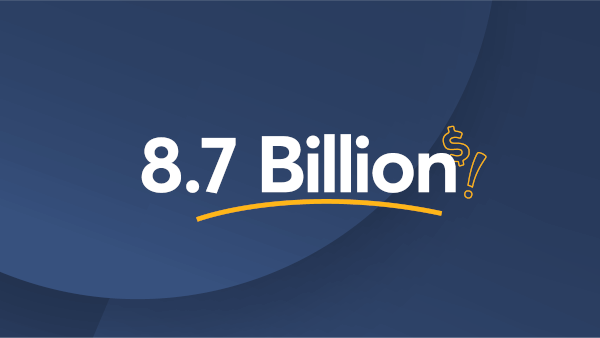Brex and Wise are Solving Growing Pain Points for Employers: Global Employee Reimbursements
The “Going Global” Challenge In today’s post-pandemic world where employees can work from anywhere and companies are more frequently hiring beyond their...

In fact, in England and Wales alone, there have been over 6 million cyber-crimes committed in the last 12 months.
While we can't tell you about every scam in the book, the list below are some of the more common things to look out for.
And remember - it’s always better to be safe than sorry. If you’re unsure, don’t part with your hard-earned cash.
If you ever receive a request from a company to “verify your account”, visit their website and reach out to their contact centre directly.
Before you part with your money, always make sure that the request did actually come from the company - not someone pretending to be them. Again, if you have any doubts - don't hesitate to ask.
Here at Wise we will never ask you to send money in advance for account verification, so let us know if you get such a request.
Making a transaction online and the offer seems too good to be true? It probably is.
Examples like cheap flats to rent in London, or really good deals on cars, are always worth exercising caution over.
If you're using Wise, remember that the person you are buying from - and thus sending money to - does not need any of your Wise account information to receive a payment. You don’t need to provide them with your membership number, for example.
Online companies like Ebay or Gumtree give great scam avoidance advice of their own. It’s always worth checking their pages too, before committing financially to something that might not turn out to be what your expecting.
This scam is an old favourite of the bad guys, with newer versions appearing every couple of months.
If any company calls to access your computer to “remove a virus” or “run a scan”, always be careful that the person on the phone is legitimate.
Scams like this often come through cold calls or emails by someone pretending to be from a popular software company. They'll often ask for a small payment to protect your systems from malware.
If you aren’t paying a subscription to an antivirus company, or experiencing issues with your computer or device, you’re better of ignoring these calls or emails. (And then you should probably go speak to a reputable vendor you trust and get your equipment protected, just in case).
Another scam that has been around for a long time.
It operates by the scammer sending you a notification that you have been paid, sent or refunded too much money - usually for a service that you have actually used. They'll then request to have a portion of it sent back.
While genuine errors like this may happen, it’s often not the case, and the money you are “refunding” is actually going straight to the bad guys.
Always wait to receive any money before you send a refund back, and double check if the numbers add up. We’d also recommend contacting the company you have traded with, directly, to confirm the details before making a payment.
You won the lottery!
You also have a long-lost, super-rich relative, who happens to be a prince! And it must be your lucky day, because the CEO of Gold’n’dosh happens to have a LOT of valuable metal to offload, but you need to act fast!
Sound familiar? These kind of scams are all over the web.
You’ll often be encouraged to send a small donation, or bridging loan, in order to reap a large reward at some point in the near future. Unfortunately it’s likely you'll never see your money again, let alone the pot of gold you were promised.
Even if you know the person contacting you, it’s likely that they have lost control of an account. Get in touch with them to check.
Scammers may ask you to send money for different charities.
Sadly scammers set up - and use - fake charities to fill their own pockets, too. When you make a donation to a charity, the likelihood is that the money will go to a worthy cause. However, please make sure you have performed a thorough background search on the charity in question, before donating your money.
You know the story. Boy meets girl online, and they just click.
Later, that boy sends the girl money. And never hears from her again.
While that tale may never be remade into a Hollywood hit movie, every year thousands of pounds is scammed from people unwittingly through dating websites and social media networks.
Here’s how the con usually works:
- A scammer sets up fake profiles that disguise themselves as beautiful men or women, with the promise to come and visit, or better their lives.
- A last minute expense crops up that’s not easily verifiable - something that makes you empathise with the situation. Like a mix up with plane tickets that the airline won’t help with, a price hike from the hotel.
- You’re then asked to cover that cost. And your dream date disappears.
If you’re sending money to someone, be sure they’re who they say they are first. Simple.
You’ve saved money all year for that deliciously lazy beach holiday, or that dream skiing trip in the Alps
Unfortunately scammers don’t take time off from scamming, and plane tickets or holiday homes are a favourite target for them.
When you book your vacation online, and you’re using a website that is new to you, make sure it’s a trusted one (google them and read reviews from other users, for example). When you’ve done your research, and are ready to book and pay, always pay through the website. Sites like Airbnb advise against paying outside of their site, for security reasons, so should your host ask you to transfer money directly to their own bank account, this should really make you think twice.
Renting a beautiful villa on the beach will most likely be expensive. However, if you see one somewhere for a lot less than the average price, there might be something fishy going on. Although wanting to save a bit of money is understandable, be careful you don’t end up in a hut on the beach, instead of that villa you wanted.
It’s also worth bearing in mind that if you use your credit card on the Wise website, the “payment protection insurance” from the credit card company won’t be valid (as you are breaking the direct buyer-seller relationship).
If you have any doubts before making a money transfer, don’t hesitate to talk with Wise Support.
We’re always happy to advise on best practices when sending money abroad.
Onwards.
*Please see terms of use and product availability for your region or visit Wise fees and pricing for the most up to date pricing and fee information.
This publication is provided for general information purposes and does not constitute legal, tax or other professional advice from Wise Payments Limited or its subsidiaries and its affiliates, and it is not intended as a substitute for obtaining advice from a financial advisor or any other professional.
We make no representations, warranties or guarantees, whether expressed or implied, that the content in the publication is accurate, complete or up to date.

The “Going Global” Challenge In today’s post-pandemic world where employees can work from anywhere and companies are more frequently hiring beyond their...

Hidden exchange rate markups estimated to cost Americans $8.7 billion in 2019 Consumers and businesses lose billions every year when they send and spend money...

Our mission has become irreversible, the company financially independent, and adoption continues to accelerate. Thank you - Wise customers - for...

To the Wise community When my co-founder and I launched Wise 7 years ago, we set out to irreversibly fix how money doesn’t work across...

Money is information. Using, storing and moving money should be as cheap and instant as exchanging information. As cheap as sending an email. And certainly it...

The grassroots story of how Hubstaff customers helped them make the switch to Wise API for mass payouts. And why they're happy they found the solution.